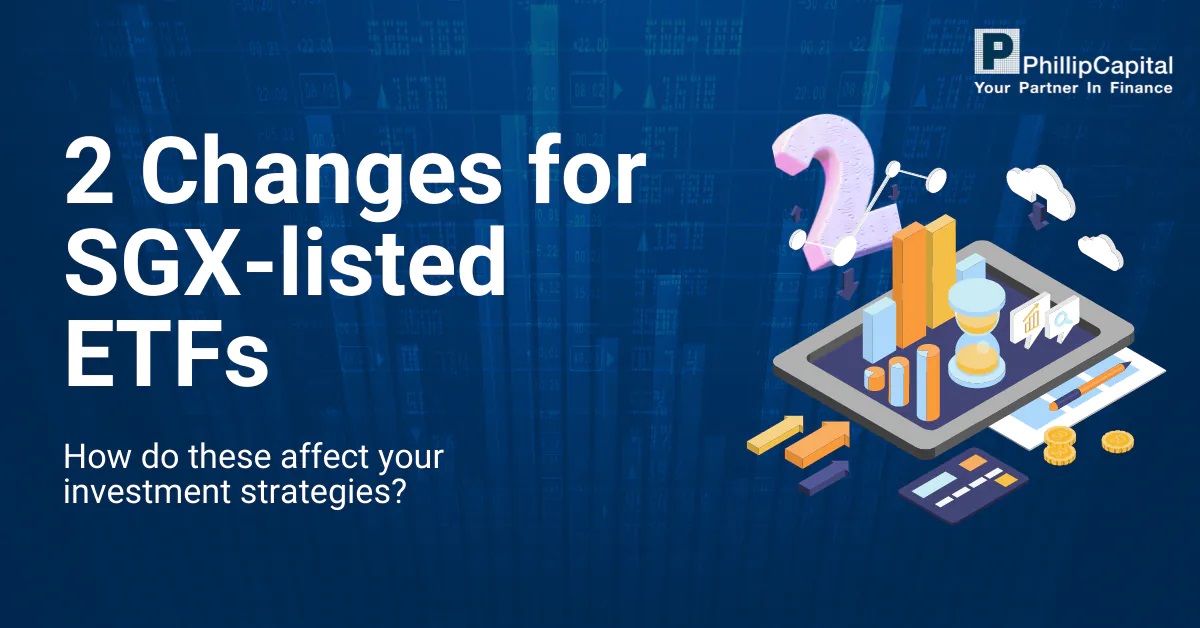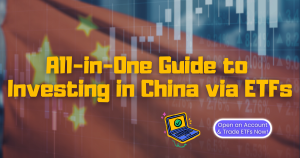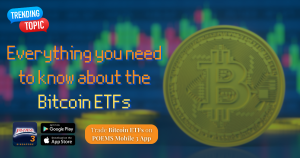2 Changes for SGX-listed ETFs February 7, 2022

2 changes for SGX-listed ETFs: How do these affect your investment strategies?
Exchange-Traded Funds (ETFs) are very popular among investors, financial advisors and financial institutions across the world. ETFs allow investors to own a diversified set of securities and stocks at a relatively low cost. This provides exposure to investors while allowing them the liquidity and convenience.
In 2021, the combined assets under management (AUM) of SGX-listed ETFs rose by S$12.55 billion year on year, more than 50 per cent of the initial amount, showing how popular the instrument is in Singapore. The changes in the SGX rules — which took effect on 17 January 2022 — have made things a whole lot more convenient for investors.
What are the changes in rules for SGX-listed ETFs?
I. Existing Forced Order Range of +/- 30 ticks will be revised to +/- 10% limit
II. Change of board lot size to 1 unit
Previously, SGX-listed ETFs had different board lot sizes that ranged from 5 units to 100 units. But now all SGX-listed ETFs will have 1-unit board lot size. This means that the minimum trade size for each board lot has been reduced by as much as 90 per cent in some cases, providing significantly more flexibility when it comes to portfolio management.
The second change involves the forced order range of +/- 30 ticks, which has been replaced with a +/- 10 per cent limit. This provides investors with greater price flexibility when it comes to the placing of limit sell and buy orders. Now, orders can be placed within the 10 per cent limit of the last reference price, without triggering the previous +/- 30 ticks forced order key.
What do these changes mean?
These changes mean that the cost of entry to buy ETFs listed on the SGX is now much lower as compared to the past.
The reduction of the board lot size to 1 unit also means that the minimum trade size per board lot is reduced, and this gives investors more flexibility when making purchases as they will be allocated more board lots of the ETF with the same amount of investment as compared to the past.
To give you an example of how the change works, assume a customer wishes to create an ETF portfolio comprising STI ETF, Gold ETF and ABF Bond ETF.
Under the old rules, he would have had to invest $31.48 in the STI ETF (board lot 10); $826.55 in the Gold ETF (board lot 5); and $11.62 in the ABF Bond ETF (board lot 10).
Now, the reduction of board lot size from 10 to 1 for the STI ETF means that the minimum trade amount has been reduced from $31.48 to $3.15.
For the Gold ETF, the reduction of the board lot size from 5 to 1 means that the minimum trade amount is reduced from $826.55 to $165.31. The reduction of the board lot size for the ABF Bond ETF from 10 to 1, this means that the minimum trade size amount has been reduced from $11.62 to $1.16. So, with the same amount of money, investors can break down their orders and buy a variety of different ETFs or with higher frequency.
In other words, customers can start investing today with less money.
What does this mean for your investment portfolio?
ETFs are open-ended investment funds, their primary objective is to track the benchmark index as closely as possible. ETFs are a form of marketable security, which have the ability to trade like a common stock on exchanges. ETFs generally hold a diversified portfolio of securities to achieve the index replication objective. While each ETF provides investors the access and exposure to the performance of the basket of assets that comprise the underlying index, ETFs benefit investors by making investing much cheaper for them than to buy the individual stocks that comprise the ETF.
One ETF you may be interested in is the Phillip Sing Income ETF. Back in May 2021, it was one of the top performing ETFs listed on the SGX, with a 12-month dividend yield of 5.2 per cent.
Its total assets were then S$65 million, and it aims to track and replicate the performance of the Morningstar Singapore Yield Focus Index.
The Nikko-AM Straits Trading Asia ETF also performed well last year, with a 12-month dividend yield of 5.1 per cent.
Another ETF you may be interested in is the Lion Phillip S-REIT ETF, with a 12-month dividend yield of 6.0 per cent.
Different ETFs track different indexes, and they also differ as they give different weightage to assets via their AUM.
How do you start investing in ETFs?
There are about 7,600 ETFs world-wide, of which POEMS provides you access to more than 20 Exchange Markets across the world. We offer extremely competitive commission pricing with a zero platform fee.
One option we have available for investors is a recurring plan. Here, customers may opt for daily, weekly, monthly or quarterly intervals to buy units at a minimum amount of $100, and the plan offers investors the choice of US, Hong Kong and Singapore ETF and equities counters. You may use our POEMS ETF Screener to find the ETFs that are suited to your investment needs.
If you use the recurring plan, you can buy more units when per unit price is lower and fewer units when per unit price is higher. Utilising the DCA strategy, also known as dollar cost averaging, safeguards your investment by reducing average cost per unit, and is especially useful when it comes to hedging against market volatility. So, the risk for investors is now much lower as compared to putting in a large sum in a single investment.
Latest promotion
To encourage investors to start investing in bite-size amounts while harnessing the beauty of DCA, the minimum commission of all SGX-listed ETFs will be removed.
For example, if your current minimum commission rate on SGX market is $10 or 0.1%, whichever is higher, from 3 Feb 2022 till 30 Jun 2022, this minimum amount will be removed and the commission will only be at 0.1%. This allows investors to spread their purchases over a longer period without incurring additional costs.
If you have further enquiries, please contact your trading representative or make an appointment to visit the nearest Phillip Investor Centres.
Alternatively, you can email us at etf@phillip.com.sg or visit our ETF page
Reference:
- [1] https://www.sgx.com/research-education/market-updates/20220105-sgx-listed-etf-aum-increased-close-50-2021
- [2] https://www.sgx.com/research-education/market-updates/20211222-etf-trading-enhancements-commence-17-jan
- [3] https://www.sgx.com/research-education/market-updates/20210616-etfs-continued-attract-investors-1h21-local-aum-nears
- [4] https://www.poems.com.sg/rsp/
- [5] 5https://www.statista.com/statistics/278249/global-number-of-etfs/
Disclaimer
These commentaries are intended for general circulation. It does not have regard to the specific investment objectives, financial situation and particular needs of any person who may receive this document. Accordingly, no warranty whatsoever is given and no liability whatsoever is accepted for any loss arising whether directly or indirectly as a result of any person acting based on this information. Opinions expressed in these commentaries are subject to change without notice. Investments are subject to investment risks including the possible loss of the principal amount invested. The value of the units and the income from them may fall as well as rise. Past performance figures as well as any projection or forecast used in these commentaries are not necessarily indicative of future or likely performance. Phillip Securities Pte Ltd (PSPL), its directors, connected persons or employees may from time to time have an interest in the financial instruments mentioned in these commentaries. Investors may wish to seek advice from a financial adviser before investing. In the event that investors choose not to seek advice from a financial adviser, they should consider whether the investment is suitable for them.
The information contained in these commentaries has been obtained from public sources which PSPL has no reason to believe are unreliable and any analysis, forecasts, projections, expectations and opinions (collectively the “Research”) contained in these commentaries are based on such information and are expressions of belief only. PSPL has not verified this information and no representation or warranty, express or implied, is made that such information or Research is accurate, complete or verified or should be relied upon as such. Any such information or Research contained in these commentaries are subject to change, and PSPL shall not have any responsibility to maintain the information or Research made available or to supply any corrections, updates or releases in connection therewith. In no event will PSPL be liable for any special, indirect, incidental or consequential damages which may be incurred from the use of the information or Research made available, even if it has been advised of the possibility of such damages. The companies and their employees mentioned in these commentaries cannot be held liable for any errors, inaccuracies and/or omissions howsoever caused. Any opinion or advice herein is made on a general basis and is subject to change without notice. The information provided in these commentaries may contain optimistic statements regarding future events or future financial performance of countries, markets or companies. You must make your own financial assessment of the relevance, accuracy and adequacy of the information provided in these commentaries.
Views and any strategies described in these commentaries may not be suitable for all investors. Opinions expressed herein may differ from the opinions expressed by other units of PSPL or its connected persons and associates. Any reference to or discussion of investment products or commodities in these commentaries is purely for illustrative purposes only and must not be construed as a recommendation, an offer or solicitation for the subscription, purchase or sale of the investment products or commodities mentioned.
About the author
Marcus Teo
Marcus graduated from the National University of Singapore (NUS) with a Bachelor’s in Economics. He joined Phillip Securities in December 2021 as an equity dealer and is part of the Central Dealing team from the Global Markets Desk. Marcus specializes in Exchange Traded Funds (ETFs) and the Asian Markets, and also supports with daily trade executions.

 All-in-One Guide to Investing in China via ETFs
All-in-One Guide to Investing in China via ETFs  Everything you need to know on Bitcoin ETFs
Everything you need to know on Bitcoin ETFs  Maximising your Tax Savings & Retirement Funds with SRS in Singapore
Maximising your Tax Savings & Retirement Funds with SRS in Singapore  Is There a “Fairest of Them All”?
Is There a “Fairest of Them All”? 









